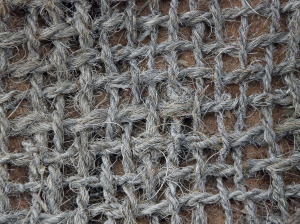Words can mean different things to people of different backgrounds. Many words have a variety of meanings or have slightly different meanings depending on how the word is used in conversation. Research teams may seek feedback from a focus group of the target population before proceeding with a planned research study or survey.
The most traditional forms of social science try rigorously to weed out bias. But when studies are consistently designed by one population to use
on a very different population, all the conditions of research become biased. The very words chosen to question people may have quite different meanings to researchers and to people living in extreme poverty.-Diane Farjour Skelton, p 80, Artisans for Overcoming Poverty [link]
The word bias is also a sewing term used to describe fabric sewn on the bias, or at an angle to the crisscrossing weave of the threads. Fabric sewn on the bias allows for a little more freedom of movement or natural stretch along the seam without the use of elastic. [1] A biased opinion has less freedom of movement, it is skewed by our personal history. Bias reflects our life long expectations of what life is like and it is based on our life experiences. Reading and experiencing a wider variety of things may help combat our tendency to expect everyone to think and react the same as ourselves.

Disclaimer: This information is provided for educational purposes within the guidelines of Fair Use.


